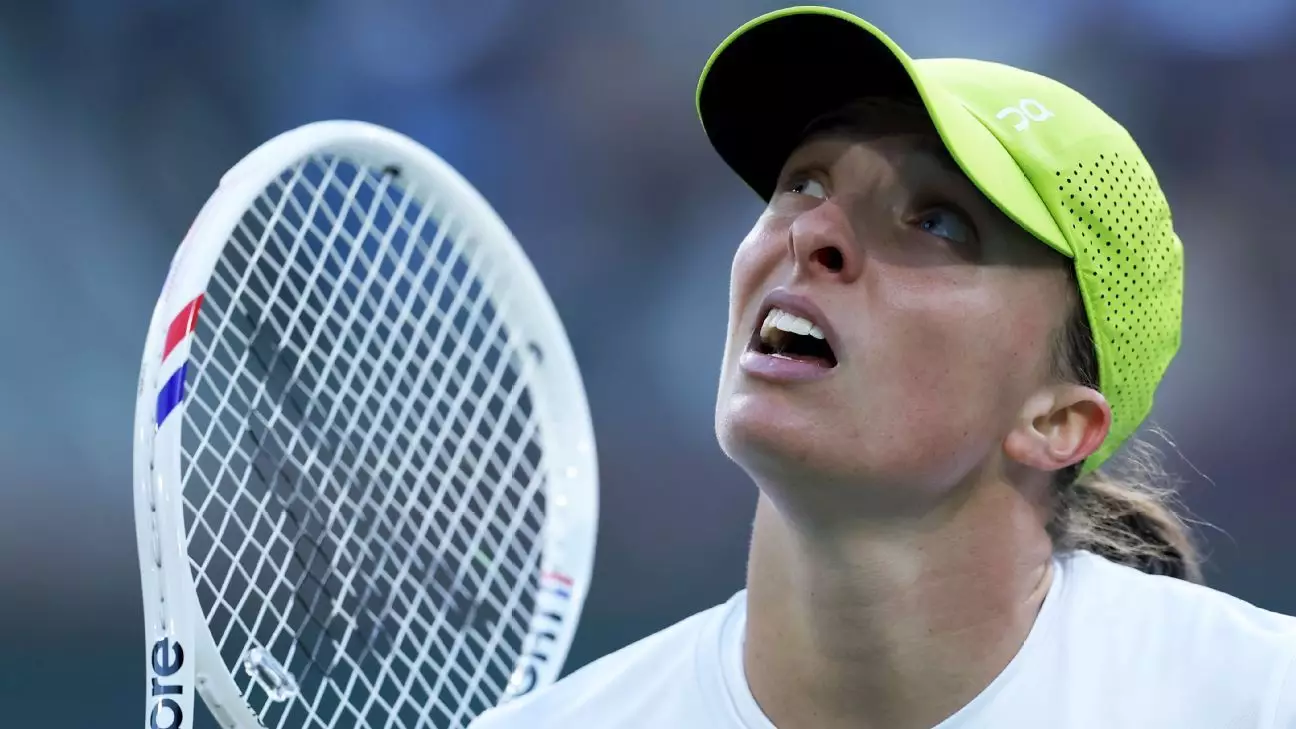In the world of professional athletics, particularly within high-stakes sports like tennis, the pressure athletes face can be monumental. The psychological toll can be as significant as the physical demands. Iga Swiatek, a prominent figure in women’s tennis, recently offered a window into her emotional landscape, revealing a narrative that extends beyond on-court performance. Her candid reflections highlight the often overlooked emotional struggles that athletes endure amid public scrutiny and high expectations to maintain peak performance.
Public Criticism and Personal Reflection
Swiatek’s outpouring addressed the intense scrutiny surrounding her behavior during matches. An incident at the Indian Wells tournament where she nearly struck a ball boy inadvertently has spawned much discussion, inviting criticism and speculation. The social media backlash exemplifies the fine line athletes tread between emotional expression and public perception. Swiatek articulated her frustration regarding the harsh judgments she received, specifically pointing out a double standard in how behaviors are interpreted. In her view, when she demonstrates intense focus without outward displays of emotions, she is labeled a “robot”; conversely, when she exhibits vulnerability or frustration, she faces accusations of immaturity. This dichotomy speaks to a larger issue: society’s relentless need to categorize individuals based on selected traits, often overlooking the complexities of human emotion.
Confronting Mental Health Challenges
Swiatek’s frank admission regarding her mental health—spending weeks grappling with profound emotional distress—underscores a critical issue in sports that is often stigmatized: mental health. The fact that high-performing athletes experience such struggles invites a potential paradigm shift in how we view mental wellness in competitive settings. Swiatek’s acknowledgment of her emotional battles, including daily crying spells and the fear of her career faltering, emphasizes that vulnerability is not a weakness but rather a part of the rigorous journey athletes navigate. Her experience illustrates the importance of fostering a more supportive environment where athletes can openly address their challenges rather than masked behind a facade of perfection.
Navigating Doping Allegations
Another formidable hurdle Swiatek faced was the doping scandal stemming from an unintended positive test for trimetazidine, a substance she claimed was contaminated due to her struggle with jet lag and sleep issues. The complexities surrounding this incident are compounded by public perceptions of doping in sports, often leading to sensationalist responses and speculation. Nevertheless, Swiatek’s ability to recover, address these matters publicly, and regain her focus represents her resilience. This episode serves as a poignant reminder of how quickly circumstances can shift in the world of sports, pushing athletes to confront not only their physical limits but also their reputations.
The Quest for Authenticity
Swiatek’s decision to share her experiences stems from a desire to reclaim her narrative amid swirling speculation. In her reflective moment, she highlights the disconnect between public perception and personal reality, inviting fans and critics alike to reconsider their attitudes towards athletes. She insists that acceptance of one’s emotional spectrum should not lead to judgments about their professionalism. This call for authenticity is essential, advocating for a discourse around emotional intelligence and openness in the hard-nosed world of competitive sports.
A Shift in Perspective
As Swiatek prepares to compete in the Miami Open, her reflections propel us toward an essential conversation about athlete well-being. Her journey reminds us that behind the accolades and records, athletes are human beings who face adversity, emotional struggles, and precarious judgments. With increasing conversations surrounding mental health and athlete behavior, Swiatek’s voice adds necessary depth. It is crucial for fans and aspiring athletes alike to recognize that resilience does not solely belong to the physical prowess seen on the tennis court; it also resides in the emotional battles fought off it. Embracing this holistic view of an athlete’s journey can foster a more empathetic sporting culture, encouraging a focus on well-rounded well-being rather than rigid adherence to past notions of strength and stoicism.


Leave a Reply